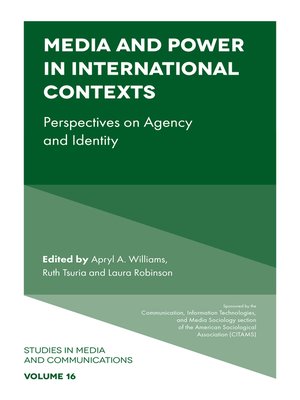Studies in Media and Communications, Volume 16
ebook ∣ Media and Power in International Contexts: Perspectives on Agency and Identity · Studies in Media and Communications
By Apryl Williams

Sign up to save your library
With an OverDrive account, you can save your favorite libraries for at-a-glance information about availability. Find out more about OverDrive accounts.
Find this title in Libby, the library reading app by OverDrive.



Search for a digital library with this title
Title found at these libraries:
| Library Name | Distance |
|---|---|
| Loading... |
This special volume of Emerald Studies in Media and Communications is entitled Media and Power in International Contexts: Perspectives on Agency and Identity. Scholars of communication, media studies, sociology, and cultural studies come together to examine axioms of power at play across different forms of cultural production. Contributing to these fields, the volume highlights the value of interdisciplinary work and international perspectives to enrich our understandings of agency and identity vis-a-vis key case studies of media consumption and production.
International contributions shed new light on the complex ways in which media reinforce and reflect power in different societal and national arenas. The result is a rich interdisciplinary and multi-method exploration of how power is conceptualized and realized through a variety of hegemonic and discursive practices. The authors' analysis of critical case studies makes important progress towards closing theoretical gaps concerning the study of the complex relationships between media and gender, race, ethnicity, and national identity. In so doing, the volume contributes phenomenological and epistemic knowledge of media and power across disciplines and societal contexts.
International contributions shed new light on the complex ways in which media reinforce and reflect power in different societal and national arenas. The result is a rich interdisciplinary and multi-method exploration of how power is conceptualized and realized through a variety of hegemonic and discursive practices. The authors' analysis of critical case studies makes important progress towards closing theoretical gaps concerning the study of the complex relationships between media and gender, race, ethnicity, and national identity. In so doing, the volume contributes phenomenological and epistemic knowledge of media and power across disciplines and societal contexts.







